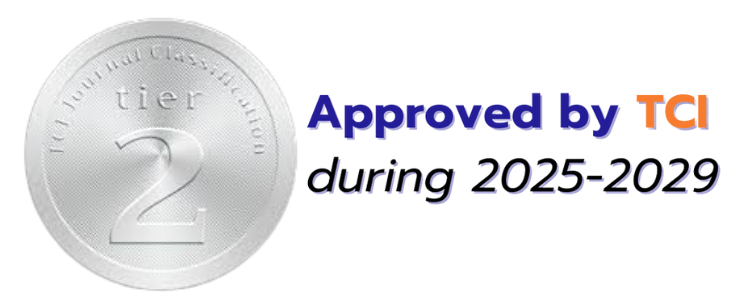Development of Board Game Enhancing Grade 10 Students’ English Vocabulary and Associative Thinking
DOI:
https://doi.org/10.56825/jehds.2025.915765Keywords:
Board game, Vocabulary memorizing skills, Associative thinking skillsAbstract
The purpose of this research were 1) to develop the board game for enhancing grade 10 students’ English vocabulary and associative thinking skills, 2) to develop grade 10 students’ English vocabulary, and 3) determine associative thinking skills for grade 10 students. The participants were selected by a convenience sampling technique which consisted of 40 students in grade 10 from a school in Thailand in the academic year 2023. Research instruments consisted of 1) International Food Board Game, 2) English vocabulary and associative thinking skills pre-test, and 3) English vocabulary and associative thinking skills post-test. The descriptive statistics used for the data analysis were mean, standard deviation, and t-test.
The result of the study were as follows. 1) grade 10 students’ memorizing skills after using International Food board game(x ̅=7.98, SD=1.44) were higher than before using the board game (x ̅=5.63, SD=1.13) . There was a statistically significant difference at .01 level which revealed that the board game could improve students’ memorizing skills. 2) Grade 10 students associative thinking skills after using International Food board game (x ̅=8.48,SD=1.41) were higher than before (x ̅=4.83, SD=1.12). There was a statistically significant difference at .01 level.
Downloads
References
Atkinson, R. C., & Shiffrin, R. M. (1968). Human Memory: A Proposed System and its Control Processes. In K. W. Spence & J. T. Spence (Eds.), Psychology of Learning and Motivation (Vol. 2, pp. 89-195). Academic Press. https://doi.org/https://doi.org/10.1016/S0079-7421(08)60422-3
Brathwaite, B. (2009). Challenges for Game Designers: Non-digital Exercises for Video Game Designers. (H. Hurley, Ed.). Course Technology PTR.
Charlier, N., & Fraine, B. (2013). Game-Based Learning as a Vehicle to Teach First Aid Content: A Randomized Experiment. The Journal of school health, 83(7), 493-499. https://pubmed.ncbi.nlm.nih.gov/23782092/
Chunthed, J. (2019). Designing a Board Game to Promote English Vocabulary Learning for Junior High School Students Thammasat University]. https://digital.library.tu.ac.th/tu_dc/frontend/Info/item/dc:176628
Kaemanee, T. (2023). Science of Teaching: Knowledge for Effective Learning Process. Chulalongkorn University Press.
Kansook, R., & Jantakoon, J. (2022). The Development of English Learning Activities by Using Board Games to Improve the English Speaking Ability for Mathayom 1 Students Journal of Buddhist Education and Research, 8(2), 61-71. https://so06.tci-thaijo.org/index.php/jber/article/view/260156
Lugmayr, A. (2012). Proceeding of the 16th International Academic MindTrek Conference. Association for Computing Machinery.
Pacher, S., Jannoi, K., Apisitsuksanti, P., & Thawornwong, C. (2022). Developing Learning Animation Media“Children’s English Vocabulary". Journal for Management Science Dhonburi Rajabhat University, 4(1), 35-49. https://so10.tci-thaijo.org/index.php/msdru/article/view/151
Ravenscroft, A. (2011). Dialogue and Connectivism: A New Approach to Understanding and Promoting Dialogue-Rich Networked Learning. International Review of Research in Open and Distributed Learning, 12(3), 139-160. https://doi.org/https://doi.org/10.19173/irrodl.v12i3.934
Siliang, M., & Manokham, T. (2021). The Media and Strategy for Teaching English to Primary Children. Journal of Roi Kaensarn Academi, 7(1), 404-416. https://so02.tci-thaijo.org/index.php/JRKSA/article/view/251452
Tanuthunmakul, J. (2021). Graphic design for edutainment board game brand for generation Y. (Independent Study, Chulalongkorn University).
Thaichantararak, P., Bunthawee, P., & Poolpoem, W. (2021). Using Vocabulary Games to Develop English Vocabulary Learning of Students at Demonstration School Buriram Rajabhat University. Journal of Variety in Language and Literature, 5(1), 163-184. https://so06.tci-thaijo.org/index.php/wiwitwannasan/article/view/246000
Downloads
Published
Issue
Section
License
Copyright (c) 2025 วารสารศาสตร์การศึกษาและการพัฒนามนุษย์

This work is licensed under a Creative Commons Attribution-NonCommercial-NoDerivatives 4.0 International License.







